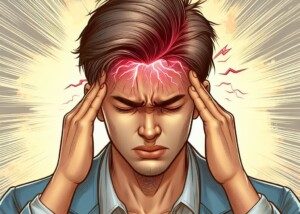
A doctor explains just HOW mental stress and anxiety create a migraine headache.
David D. Clarke, MD, is president of the Psychophysiologic Disorders Association.
Physical ailments from mental stress are a real phenomenon and can persist for years. Dr. Clarke is also Clinical Assistant Professor of Gastroenterology Emeritus, Oregon Health & Science University, Faculty Associate, Arizona State University.
Stress often causes migraine headaches—but how does this happen?
“Mental stress is capable of causing pain and other physical symptoms almost anywhere in the body including headache,” explains Dr. Clarke.
“Stress can cause routine muscle tension headaches but also headaches that closely resemble true migraine.
“The mechanism is not entirely understood but may involve one or more of muscle contractions around the skull, altered processing of sensory signals by the central nervous system and altered muscle contraction in blood vessels of the head.”
Dr. Clarke continues, “Distinguishing the various types of headache from each other can, at times, be a diagnostic challenge even for specialists.
“The most reliable way to determine if headaches are stress-related is to identify the source(s) of stress, then treat the stresses and see if the headache is substantially or completely relieved.
“Complete relief of headache pain after reducing or eliminating the causative stress(es) is the only way to be completely certain there is no other cause. (This is the case for stress-related symptoms in general: if the symptom goes away after treating the stress, then our confidence is high that stress caused the symptom.).”
What stresses you out?
Your body can’t tell the difference between over-reaction to a minor inconvenience and justified reaction to a major life setback.
Learn to choose your inner battles wisely, for the sake of your body’s well-being. If you’re going to get a headache over something, it shouldn’t be over your daughter’s new hair style.
“The great challenge here is identifying the causative sources of stress, which are often not obvious either to the person suffering the headache or to their physician,” explains Dr. Clarke.
“Many people fail to recognize how much stress they are suffering from sources such as a personal crisis (career, religious, health, financial, gender identity, etc.), lack of self-care skills (difficulty putting yourself on the list of people for whom you care), marital or family issues or workplace problems.
“Other important types of stress that may be unrecognized include the prolonged impact of childhood adversity, post-traumatic stress, anxiety disorders and depression.
“A screening questionnaire that can help identify some, though not all, of these sources of stress is available here: stressillness.com/overview.php.”
An important thing to consider when it comes to headaches is if they are new-onset and accompanied by other neurological symptoms such as visual disturbances, weakness or numbness on one side of the body, slurred speech, confusion or cognitive difficulties, dizziness, strange sounds in the ear or a drooping eyelid.
Do not delay in seeing a physician. A sudden, “thunderclap” headache that’s of the worst pain you’ve ever had warrants a prompt trip to the ER.

Since 1983 Dr. Clarke has successfully cared for over 7,000 patients with stress illness.
 Lorra Garrick has been covering medical, fitness and cybersecurity topics for many years, having written thousands of articles for print magazines and websites, including as a ghostwriter. She’s also a former ACE-certified personal trainer.
Lorra Garrick has been covering medical, fitness and cybersecurity topics for many years, having written thousands of articles for print magazines and websites, including as a ghostwriter. She’s also a former ACE-certified personal trainer.
.









































